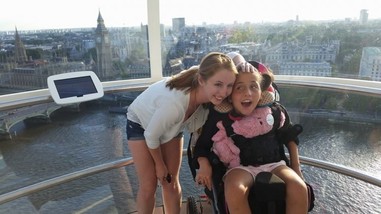 To my fellow siblings of children with special needs: I’m going to give you some unsolicited advice. But first, let me start by saying I’m the proud older sister of a beautiful 12-year-old girl with a severe physical disability. Though I’m nearly eight years her senior, my sister, Lexi, is my best friend. Since her birth, my family’s path has been a little bumpy, but I feel blessed to have Lexi in my life every day. I don’t think for a minute that my experiences with Lexi give me any license to comment on your life or your feelings. I’ve spent many years trying to explain to parents that even they cannot truly understand what it’s like to be the sibling of their child with special needs. The relationship between a parent and a child is so different from the one between two siblings. I’d be entirely hypocritical to suggest it’s not difficult to be the parent; I’m awestruck by the strength of my mom and dad every day. But my parents cannot understand what it’s like to be Lexi’s sister any more than I can understand what it’s like to be her mom or dad. In the same fashion, I cannot understand what it’s like to be your sibling’s sister any more than you can understand what it’s like to be Lexi’s. But I do like to think my past 12 years of both angst and joy with my sister have left me with some insight into living in the world of disabilities. So I’m going to share with you a few things I think are important for every sibling of a child with special needs to know. Your life will be hard. You know this, obviously, but I still think it’s a critical to acknowledge this. Countless doctors, physical therapists, family friends, and, occasionally, even strangers in the middle of the grocery store have told me the hard times are nothing compared to the knowledge and inspiration I will gain just from being Lexi’s sister. I love Lexi more than anything in the world, but being her sister straight up sucks sometimes. It’s more than feeling a pang of jealousy or worry in my heart, and it’s more than the frustration that comes with constantly preoccupied parents. For me, it’s the devastating injustice of having my college fund drained to pay off medical bills. It’s the crippling guilt that comes with watching my mom struggle to take care of my sister when I leave for school. It’s an undying commitment to take care of a child who isn’t mine to take care of. I don’t want you to get the wrong idea because I wholeheartedly believe it’s all worth it. I wouldn’t trade Lexi for anything or anyone. But I also think it’s so important for you to know that it’s OK to feel like disabilities suck sometimes. It’s OK to be jealous and resentful and guilty. It’s OK to be tired of hearing about healthcare and insurance, and it’s OK to wish your life was easier. I certainly feel that way sometimes. To read more click here: http://themighty.com/2015/01/to-my-fellow-siblings
0 Comments
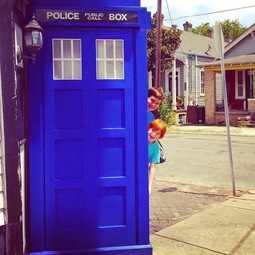 *Editor's note: The following was a conversation I was lucky to be privy to between my two sons, over the course of about twenty minutes. I've omitted several things for privacy, and cleaned up others, while trying to keep the language as close to the original conversation as possible. I received both sons' permissions before publishing this. "Morgan," Bay asked, "what's it like to be you?" The question was asked as the boys finished dinner and I sat away from them, reading a book. I marked my place and quietly listened. "Well," Morgan said, "it's confusing. You know I'm an autism kid. Noises are big. Clothes have to be soft. Smells are hard." He went back to eating, apparently satisfied with his answers. "But, Morgan, what's it like? Why is it confusing to be you?" Morgan took a deep breath, pondered this question some, and then said, haltingly, "People think I don't listen, but I do. Teacher always says, 'Pay attention, sweet boy!' but I am paying attention. It's hard. I pay attention to everything, all at the same time. I can't pay attention to just one thing... I can't always use my words." "There are all of these sounds and thinks (thoughts) and I can't just pick one. Can you?" I sat, stunned. Morgan's never talked to his father or I like this. He's never really been able or rather, we've never been able, to get him to talk to us like this. "Morgan," his brother started, "why do you script? Why do you use Thomas so much and love him so much?" "I just do. The stories are in my head, 'cause I'm a narrator. I love Thomas, he's my friend. He's a very useful, cheeky engine." "But you know, other kids don't like him as much, right? I mean, aren't you worried about bullies? Why do you talk like that (meaning nasally quality/monotone and scripting)?" "I don't care if they don't like him, Mama says he's mine to love. Mama and Daddy say bullies just don't get hugged enough. I told you- I talk like this 'cause Jesus made me this way. Now, stop being a bossy boiler or this conversation is over!" (note the script) Me: "Morgan, is there anything that's really hard for you?" "Yeah, people when they give me too many directions. That's hard." Having my own struggles with this, I agreed with him. "Going new places used to be bad, but sometimes it's fun now. But not too much. Rounding (numbers). Noise. Making people understand me." "Haircuts used to be really hard, right?" "Yep, but they're not so bad now. The hairs still feel like poking on my skin, and I'm scared my ears'll be chopped off." "Mama won't cut your ears off-" "But I feel the scissors coming in! My brain tells me my ears are in danger and I need to yell!" Me: "What would you make people understand?" "I need to chuff (when he makes train noises and moves his arms in a circular motion, bent at the elbows). Ya know, trees stim? I'm a good boy and really useful. Don't talk about me in front of me. Kids shouldn't make fun, the grown ups, either. It's mean. People should understand people." I started tearing up. Bay: "What's easy for you? You're good at lots." "Making breakfast (he makes English muffins with cream cheese every morning for himself). Thomas stories. Tying my shoes. Making train sets. Snuggling. Smiling. Laughing. Swimming. Remembering the way." To read the rest of this amazing article click here: http://www.decipher-morgan.com/2014/10/what-its-like.html 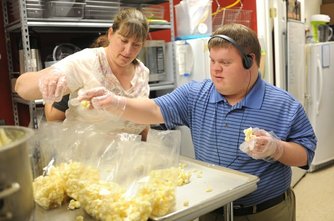 Blake Satterfield is proud to open the door and greet guests at Special Kneads and Treats on the Lawrenceville downtown square. He shows guests to a table and to the gourmet cupcakes on display behind the bakery counter. Blake has Down syndrome and wouldn’t be the first person many businesses would put at their front door. But Blake and others with special needs are the reason why Special Kneads and Treats opened four weeks ago. “From his first day here, he has felt included and productive,” said Blake’s mother, Pat Satterfield. “It’s a wonderful thing for our guys to give back to the community and feel accepted and useful. Once they get the hang of things, when they see a need, they get things done and make people feel welcome.” Special Kneads and Treats at 132 E. Crogan St. is a nonprofit bakery that provides job skills training to special needs adults. It was opened by Tempa Kohler and her husband, Michael, when they purchased the former Sweets on the Square. “We prayed for only provisions and a building and God gave us a bakery with ovens, freezers and an established client base,” Tempa Kohler said. “And now we’re building our own client base. It’s awesome and definitely a God thing.” The Kohlers opened the bakery to help their son Bradley, 24, who was diagnosed with Fragile X Syndrome when he was 7 years old. Fragile X Syndrome is a genetic chromosome disorder that causes mild to severe mental impairment. “Kids with special needs can stay in the Gwinnett School system until they are 22 years old and then they age out,” said Kohler. “We’re here to employ special needs adults and give them a place to come and work and hopefully learn a skill set that they can take to another location.” Kohler is operating the bakery with one employee and five special needs adults who often have family members who stay and help with baking duties. The special needs adults have opened the door and greeted guests, washed dishes, cleaned tables, swept the floor and helped with lettering on cupcake wrappers denoting when they were made. They also help in the kitchen when adequate supervision is in place. Adults with special needs are loyal,” Kohler noted. “They’ll be the first to show up and if you show them a job, they will do it and do it well.” To Read the full article click here: http://www.gwinnettdailypost.com/news/2014/mar/01/lawrenceville-bakery-provides-job-skills-training/ 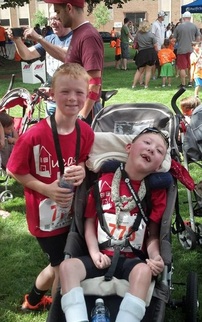 Lucas was born with lissencephaly, a rare brain malformation that only occurs in 85,470 births. It can result in seizures, difficulty swallowing, and other serious problems. When Noah heard about the local YMCA youth triathlon, he told his parents he wanted to take part, but with one very special request—he wanted to take his brother Lucas with him! Noah trained for almost three months before the triathlon began. On the big day, July 12th, he cycled for 3 miles, swam over 200 yards and ran for 1 mile pushing Lucas in a special buggy. "They have an amazing bond. They're best friends and they do everything together" said mom Alissa Aldrich says. "The connection and the love that they share is truly unique." These brothers show us the meaning of love and friendship, and prove that no matter the obtabcles, you can do anything when you put your heart and soul into it. You don’t see incredible acts of love every day, but this 8-year-old shows us it doesn’t take much to make a huge difference in the lives of others. Read more at: http://www.the-open-mind.com/8-year-old-completed-a-triathlon-while-carrying-his-disabled-brother-the-whole-way/#R4IByoYcLyxIzGYv.99 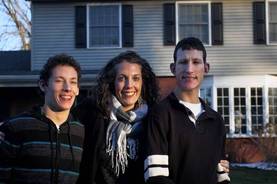 Growing up with a severely disabled brother, Abby Brown felt less like a sister than like a "third parent." Nigel, two years her junior, was born with a rare disease called linear sebaceous nevus syndrome that left him non-verbal and needing assistance to eat, dress and use the toilet. As a child, Brown mourned the normal things she couldn't do, like take family vacations or go to the mall, without her brother having a seizure. As an adult, she nervously anticipates a time when she'll be in charge of his care."Where will he live when my parents are unable to take care of him?" wonders Brown, 21, a student at Nipissing University in North Bay, Ontario. "How will I manage taking care of aging parents, a disabled brother and children of my own? Will I ever find a partner who is willing to take on the responsibility of caring for my sibling with me?" Brown's concerns are emblematic of the complex, lifelong and generally unsung relationships between disabled people and their siblings, who often log more years than anyone supporting their special needs brothers and sisters without getting much support of their own. "I find myself frequently in the ludicrous position of having to remind my friends, my colleagues, people who worship at the altar of family-centered services, that siblings are part of the family," said Don Meyer, director of the Seattle-based Sibling Support Project (siblingsupport.org) and creator of Sibshops, workshops that bring together the siblings of special needs kids for recreational activities and peer support. On his Facebook group Sibnet, an adult sibling support site with 1,300 members, Meyer is struck by how common it is for 40-year-olds to proclaim it's their first time meeting others who grew up with developmentally disabled siblings. "People who work with families of kids with special needs would never let the parents wait 40 years to introduce them to their peers," Meyer said. Lifelong challenge A sibling's need for support begins early, Meyer said, as growing up alongside a disabled child forges complicated feelings, from embarrassment to resentment to many forms of guilt. Some siblings feel pressure to be high achievers to balance the scale. Many yearn for the friendship of a "normal" sibling relationship. The experience has its benefits, too: Siblings of special needs kids tend to develop early maturity and increased patience, diplomacy, tolerance and acceptance of difference, Meyer said. Many pursue helping professions, where they serve as powerful advocates for marginalized populations. As parent caregivers get older, a sibling's role takes on new importance, and underscores the value of nurturing the siblings' relationship. About 75 percent of the 4.6 million developmentally and intellectually disabled people in the U.S. live with their families. "If we affirm and validate their contributions as they grow up, we increase the chances that they will elect to remain lovingly involved in their (disabled siblings') lives," Meyer said. To read more click here: http://articles.chicagotribune.com/2013-03-28/features/sc-fam-0326-disabled-sibling-20130326_1_disabled-siblings-sibling-support-project-don-meyer 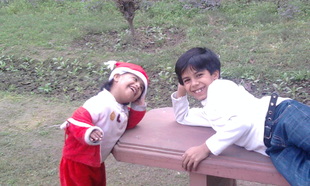 Most of the time the sibling relationship between a ‘typical‘ and a ‘special needs’ child is based on parental or ‘professional’ opinions or perspectives and most of the time, they only present one side of the story. Something that we have always read on nicely written parents’ blogs, i.e. powerful, respectful, uncomplicated and passionate. While the truth is that even if it seems like all ‘sugary with love‘, it cannot remain consistent throughout their growing up years. Those who think otherwise read too much fiction and need a reality check! Think about it, can any relationship be all hunky-dory? Do we really look close enough or scratch the surface a little and have open heart to heart talks with our ‘typical’ children? Do we take it for granted that they are young and do not go through the similar or usual roller coaster ride of emotions that we as parents experience. The Truth?The truth is that a sibling’s role is still the least talked or discussed about, while they remain that one person who is going to share the longest lasting relationship with our child of special needs, more than the parents! We like to believe that as parents we have it hardest, but pay a little attention and you will be surprised to find out that it’s not always compassion, sympathy or love that our ‘normal’ child is experiencing. They too have concerns which are in some ways identical to what we as parents go through like a need for information, guilt, blaming themselves, loneliness, future concerns and in some ways quite different emotions like peer issues, resentment, sibling rivalry and a pressure to perform. It also makes a great difference if the sibling is elder or younger to the child with disability. It is because the younger siblings don’t know any other way of life; he is born into that situation. But in case of older siblings and especially if there is a large gap, they remember the attention, the time they shared alone with the parents. From the Horse’s MouthWhile reading and researching about this issue, I came across a radio show excerpts on ‘Siblings with special needs change childhood’. The show was asking people to share their ‘experiences of having a brother or a sister with special needs’. I was all ready to hear some nice emotional sentiments and touching stories of how that experience changed the lives of these callers and how they were eternally thankful for having the brothers or sisters they had, but I had the reality biting me in few seconds when I heard the reactions of a Girl with a special needs brother. In her own words, ‘you know, as we grew up, I can relate too to being kind of ashamed of my brother but also kind of missing out on a brother-sister relationship like my friends had. And that was difficult too. You know, and a lot of attention does go to the child. I can remember coming home from school a lot of times, and my Mom, you know, was somewhere with my brother for some sort of an appointment, and this went on and on for like a couple of school years this way” I almost felt wet in my eyes. Was it my story? Was I giving too much attention to my daughter with Down syndrome? I started listening again to be sure if that call was just an exception, but there were more calls to follow. To Keep reading click the link below: http://www.twominuteparenting.com/5-things-to-make-sure-your-sibling-is/ |
AuthorRebecca is an independent publisher working to help siblings of children with emotional challenges. Archives
April 2017
Categories
All
|
My Big Brother Bobby: A Story to Help Kids Understand Angry Feelings and Behaviors in Others
 RSS Feed
RSS Feed
